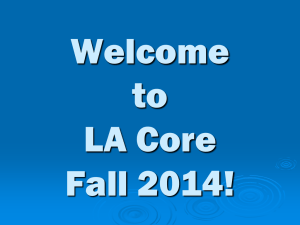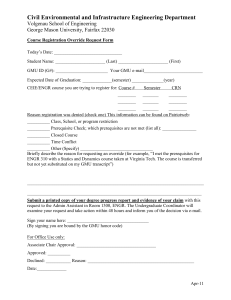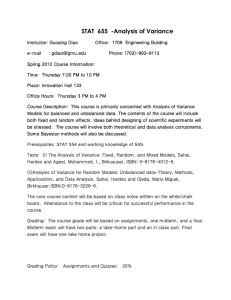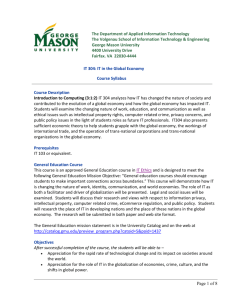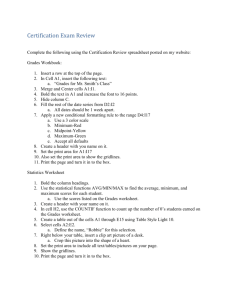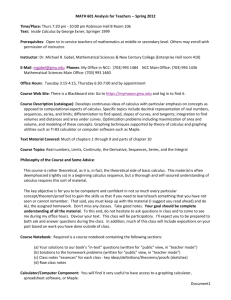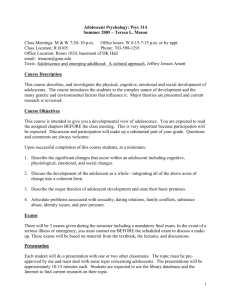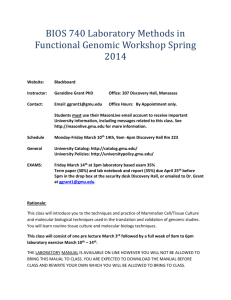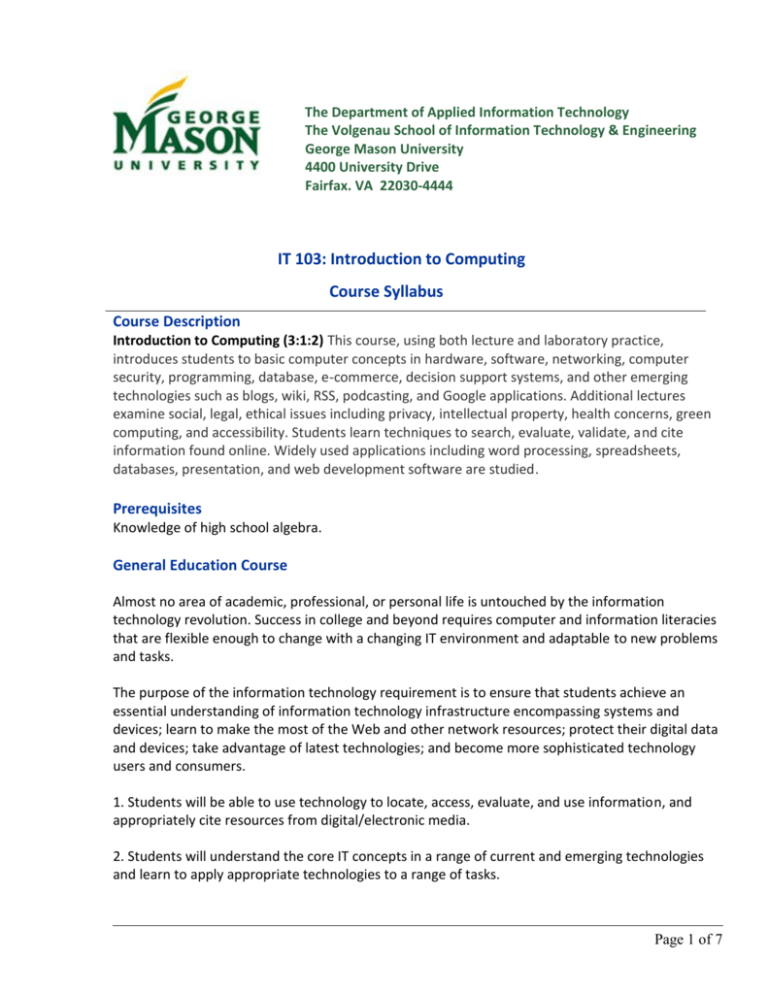
The Department of Applied Information Technology
The Volgenau School of Information Technology & Engineering
George Mason University
4400 University Drive
Fairfax. VA 22030-4444
IT 103: Introduction to Computing
Course Syllabus
Course Description
Introduction to Computing (3:1:2) This course, using both lecture and laboratory practice,
introduces students to basic computer concepts in hardware, software, networking, computer
security, programming, database, e-commerce, decision support systems, and other emerging
technologies such as blogs, wiki, RSS, podcasting, and Google applications. Additional lectures
examine social, legal, ethical issues including privacy, intellectual property, health concerns, green
computing, and accessibility. Students learn techniques to search, evaluate, validate, and cite
information found online. Widely used applications including word processing, spreadsheets,
databases, presentation, and web development software are studied.
Prerequisites
Knowledge of high school algebra.
General Education Course
Almost no area of academic, professional, or personal life is untouched by the information
technology revolution. Success in college and beyond requires computer and information literacies
that are flexible enough to change with a changing IT environment and adaptable to new problems
and tasks.
The purpose of the information technology requirement is to ensure that students achieve an
essential understanding of information technology infrastructure encompassing systems and
devices; learn to make the most of the Web and other network resources; protect their digital data
and devices; take advantage of latest technologies; and become more sophisticated technology
users and consumers.
1. Students will be able to use technology to locate, access, evaluate, and use information, and
appropriately cite resources from digital/electronic media.
2. Students will understand the core IT concepts in a range of current and emerging technologies
and learn to apply appropriate technologies to a range of tasks.
Page 1 of 7
IT 103
Summer 2013
Syllabus
3. Students will understand many of the key ethical, legal and social issues related to information
technology and how to interpret and comply with ethical principles, laws, regulations, and
institutional policies.
4. Students will demonstrate the ability to communicate, create, and collaborate effectively using
state-of-the-art information technologies in multiple modalities.
5. Students will understand the essential issues related to information security, how to take
precautions and use techniques and tools to defend against computer crimes.
The General Education mission statement is in the University Catalog (p. 9) and on the web at
http://www.gmu.edu/departments/provost/gened/
Objectives
After successful completion of the course, the students will be able to –
Understand basic functions of computer hardware and software components including
operating system functions
Identify various networks (LAN, WAN, intranet), topologies (ring, bus, star), protocols
(TCP/IP, SMTP, POP & IMAP, HTTP & HTTPS, DNS), media types (wire pair, coaxial cable,
fiber optics, microwave, radio frequency, infra-red), and network hardware (router, hub,
gateway)
Know how to use search techniques (inclusion, exclusion, wildcards, phrase, Boolean
search), evaluate the information found on Web pages (chat rooms, newsgroups, RSS,
podcasting sites, Wikipedia, blogs), and cite electronic and printed references
Understand computer viruses, biometric devices, encryption technique, digital signature,
email filtering, firewall, and precautions on Web
Understand ethical issues regarding copyright, software licenses, information privacy,
intellectual property, content filtering, Spam, and laws enacted with regards to SPAM,
children’s protection on Web, electronic communication, and electronic theft
Understand IT impact on society (health and environment)
Design and create web pages using XHTML
Create blogs and wikis
Use different application programs like word processing, spreadsheet, presentation, and
database management systems
Understand the fundamentals of system analysis, life cycle of a program development and
programming languages, artificial intelligence, and e-commerce.
Credit by Examination
Students who think they already know the material in IT 103 should read the information on Credit
by Examination posted on http://ait.gmu.edu/student/it103/it103_testout web site.
Copyright © 2013 Kamaljeet Sanghera. All rights reserved.
Page 2 of 7
IT 103
Summer 2013
Syllabus
Textbooks
There are two required textbooks for the course.
DO NOT buy used book of Introduction to Computer Information Systems, author: Steinberg. Used
textbooks do not contain CompAssess code which is required in the course.
Grading
1. Kendal/Hunt Introduction to Computer Information System,
1st Edition. ISBN: 978-0-7575-5191-8 Steinberg (Author).
Available at GMU bookstore.
2. Kendal/Hunt. Fundamentals of Computing, 3 rd edition. ISBN:
978-0-7575-8556-2 Customized e-book, available at book
and from publisher’s website –
http://www.khwebcom.com/fundofcomputing
Grades will be awarded in accordance with the GMU Grading System for undergraduate students.
See http://www.gmu.edu/catalog/apolicies/ under Grading System for more information.
The grading scale for this course is:
97 – 100%
A+
Passing
93 – 96%
A
Passing
90 – 92%
APassing
87 – 89%
B+
Passing
83 – 86%
B
Passing
80 – 82%
BPassing
77 – 79%
C+
Passing
73 – 76%
C
Passing
70 – 72%
CPassing*
60 – 69%
D
Passing*
0 – 59%
F
Failing
* Grades of "C-" and "D" are considered passing grades for undergraduate courses. However, a
minimum grade of "C" is required in the BSIT program for any course that is a prerequisite for one
or more other courses. This course is a prerequisite for several courses in BSIT program – see
http://www.gmu.edu/catalog/courses/it.html for more information on those courses.
Raw scores may be adjusted by the Instructor to calculate final grades.
Copyright © 2013 Kamaljeet Sanghera. All rights reserved.
Page 3 of 7
IT 103
Summer 2013
Syllabus
Final grades will be determined based on the following components:
Item
In-class Exercises
Project Part I (Research Paper)
Project Part II (Web site)
Lab In-lab Exercises and Homework
Assignments
Midterm Practice Test (conducted in lab)
Final Practice Test (conducted in lab)
Midterm Exam (conducted in lab)
Final Exam (conducted in lab)
Total Points
Points
50
150
150
150
Percent
5%
15%
15%
50
50
200
200
1000
5%
5%
20%
20%
100%
15%
These components are outlined in the following sections.
In-class Exercises
There will be seven (7) in-class exercises with the two (2) lowest grades being eliminated. Thus,
only five (5) in-class exercises count in the overall grade for the course. No makeups for any missed
in-class exercises for any reason.
Project Part I and II:
See the project page in the lecture Blackboard folder for details.
Lab Schedule
Lab schedule, assignments and their due dates are contained in the lab syllabus posted on lab
Blackboard folder.
Midterm and Final Practice Tests
Midterm and final practice tests are conducted in lab. Their dates are included in the lab
Blackboard folder. Attendance in both practice tests is mandatory.
Exams (midterm and final)
Both midterm and final exams are “closed book”. Exams are conducted on CompAssess in lab. You
must bring your valid GMU ID to lab on the scheduled exam dates.
No makeups for missed exams for any reason.
Final grades will be posted to PatriotWeb, which is the only vehicle for students to obtain those
grades. A student with a "hold" on his/her PatriotWeb account will be unable to access final grades
until the hold has been removed by the Registrar.
Copyright © 2013 Kamaljeet Sanghera. All rights reserved.
Page 4 of 7
IT 103
Summer 2013
Syllabus
Schedule
Week
Lecture/Topic
Introduction to the course
1
Project part I: Research paper specification
review
Library and Internet Research
Lecture Reading Assignment
Research paper specifications
posted under Project’s folder
InfoGuide
(http://infoguides.gmu.edu/it103)
2
Internet and WWW
Chapter 2
3
Hardware
Chapter 3
4
Software
Chapter 4
5
Data Communications and Networking
Chapter 5
Systems Analysis
6
Project part I: Research Paper Due
Midterm Exam Review
7
8
Chapter 6
Review Sheet posted on
Blackboard
Midterm Exam
XHTML
Chapter 9
Project part II: Website specification review
9
Computer Programming
Chapter 7
10
Database and SQL
Chapter 8
11
12
13
14
E-commerce
Project part II: Website Due
Security, Ethics, and Privacy
Artificial Intelligence
Future of Computing
Impact of Computing on Society
Final Exam – Review
Chapter 10
Chapter 11
Chapter 12 & 14
Chapter 13
Chapter Review Sheet posted on
Blackboard
Final Exam (Check Blackboard for the final exam schedule)
The reading assignment shown for each lecture is to be completed prior to that lecture.
This schedule is subject to revision before and throughout the course.
Copyright © 2013 Kamaljeet Sanghera. All rights reserved.
Page 5 of 7
IT 103
Summer 2013
Syllabus
Religious Holidays
A list of religious holidays is available on the University Life Calendar page. Any student whose
religious observance conflicts with a scheduled course activity must contact the Instructor at least
2 weeks in advance of the conflict date in order to make alternative arrangements.
Attendance Policy
Students are expected to attend each class, to complete any required preparatory work, and to
participate actively in lectures, discussions and exercises. As members of the academic community,
all students are expected to contribute regardless of their proficiency with the subject matter.
Students are expected to make prior arrangements with Instructor if they know in advance that
they will miss any class and to consult with the Instructor as soon as possible if they miss any class
without prior notice. Any student who expects to miss more than two class sessions is strongly
advised to drop the course and take it in a later semester when he/she can attend every class.
Departmental policy requires students to take exams at the scheduled time and place, unless there
are truly compelling circumstances supported by appropriate documentation. Except in such
circumstances, failure to attend a scheduled exam will result in a score of zero (0) for that exam, in
accordance with Mason policy on final exams. Students should not make travel plans or other
discretionary arrangements that conflict with scheduled classes and/or exams. If the University is
closed due to weather or other unforeseen conditions, final exams may be rescheduled – students
are strongly advised not to make plans that would prevent them from attending exams that may be
rescheduled during the entire exam period.
Classroom Conduct
Students are expected to conduct themselves in a manner that is conducive to learning, as directed
by the Instructor. Any student who negatively impacts the opportunity for other students to learn
will be warned – if disruptive behavior continues, the student will be asked to leave the classroom.
Communications
GMU e-mail is the preferred method of communication.
Students must use their MasonLIVE email account to receive important University information,
including messages related to this class. Federal privacy law and GMU policy require that any
communication with a student related in any way to a student's status be conducted using secure
GMU systems.
Privacy
Instructors respect and protect the privacy of information related to individual students. Instructors
will take every possible measure to protect the privacy of each student's submissions, scores and
grades.
Copyright © 2013 Kamaljeet Sanghera. All rights reserved.
Page 6 of 7
IT 103
Summer 2013
Syllabus
Disability Accommodations
Any student with a disability of any kind is strongly encouraged to register with The Office of
Disability Services (ODS) (703.993.2474) as soon as possible and take advantage of the services
offered.
Accommodations for disabled students must be made in advance – ODS cannot assist students
retroactively, and at least one week's notice is required for special accommodations related to
exams. Any student who needs accommodation should contact the Instructor during the first week
of the semester so the sufficient time is allowed to make arrangements.
Honor Code
All members of the Mason community are expected to uphold the principles of scholarly ethics.
The GMU Honor System and Code1 will be strictly enforced in this course. Any use of the words or
ideas of another person(s), without explicit attribution that clearly identifies the material used and
its source in an appropriate manner, is plagiarism and will not be tolerated. Blackboard’s
SafeAssign tool is used to detect plagiarism in any work submitted by students for this course.
For this course, the following requirements are specified:
All assessable work is to be prepared by the individual student, unless the Instructor explicitly
directs otherwise.
All work must be newly created by the individual student for this course for this semester.
Any usage of work developed for another course, or for this course in a prior semester, is strictly
prohibited without prior approval from the instructor.
Students may seek assistance with assigned work (and are encouraged to do so if they feel the
need), provided the directions for the assigned work do not prohibit such assistance and assistance
is acknowledged in the submitted work, clearly identifying the person(s) giving assistance and the
nature of the assistance given.
Available Resources
WRITING CENTER: A114 Robinson Hall; (703) 993-1200; http://writingcenter.gmu.edu
UNIVERSITY LIBRARIES “Ask a Librarian” http://library.gmu.edu/mudge/IM/IMRef.html
COUNSELING AND PSYCHOLOGICAL SERVICES (CAPS): (703) 993-2380; http://caps.gmu.edu
INFOGUIDES: http://infoguides.gmu.edu/it103
1
Available at www.gmu.edu/catalog/apolicies and related GMU Web pages.
Copyright © 2013 Kamaljeet Sanghera. All rights reserved.
Page 7 of 7

